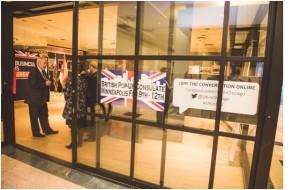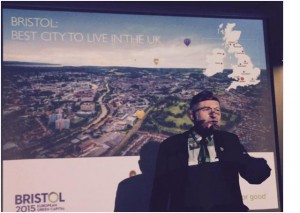11th May 2015 Chicago, USA
Sharing Sustainability

In February the British Consulate in Chicago decamped to Minneapolis for a week in order to increase our engagement in the Twin Cities. A week-long series of events focused on trade, investment, and science. We worked with the University of Minnesota’s Institute on the Environment to bring together local researchers, businesses and students to talk about what cities can do in the fight against climate change. We were joined in our discussion by Professor Martin Bigg from the University of the West England to champion the UK City of Bristol as European Green Capital, Gayle Prest, Head of Sustainability for the City of Minneapolis, and Simon Sharpe the FCO’s Head of Climate Risk. The institute blogged on what they learned from the session here. It’s also available to watch on YouTube. Here we speak to Prof Bigg about his visit.

Martin Bigg is Professor of Environmental Technologies Innovation at the University of the West of England, Bristol and Director of the Environmental Innovation Network supporting small business in South West England. He is closely involved with the City of Bristol as the European Green Capital for 2015
Why were you in Minneapolis?
I was very pleased to be invited to join the “Pop Up” British Consulate in Minneapolis supporting the UK-US relationship. It was a great opportunity to provide an overview of Bristol’s work and actions on climate issues, becoming European Green Capital 2015, and plans for the future. During events with the Institute on the Environment at the University of Minnesota we looked at local and national approaches to tackling climate change and shared challenges and opportunities from a major city perspective. As an academic who is also heavily involved with supporting small businesses, it has been a valuable opportunity to join in a range of other activities with the universities, businesses and non-government organisations to develop collaboration opportunities and better mutual understanding.
What do Bristol and Minneapolis have in common?
Bristol and Minneapolis have similar size populations — circa 400k – and are located in the “Mid West” with major economic relations and impacts over a far reaching area. They are both home to major international companies and encourage innovation and enterprise. Both demonstrate a high level of environmental awareness and commitment, developing and delivering policies and targets on a wide range of environmental measures including energy generation and management, waste management, air quality, and travel and transport. Successful effective leadership is a feature of each city and there is a strong appetite to share and learn.
Are there any examples of sustainable policies in action?
Both Bristol and Minneapolis are investing in clean technologies for transport and I was particularly impressed by the new and efficient metro and hybrid bus network in Minneapolis. Both cities are committed to further developing cycling, although the cold weather can be discouraging in Minneapolis and the hills in Bristol! Both cities contain centres of excellence on addressing climate change and developing renewable energy. Other practical measures by both cities include: the use of LEDs in street lighting; support for local community led solar energy projects, and the encouragement of recycling.
What can the two cities learn from each other?
There is much we in the UK can learn from the local enterprise, democracy and decision making in the US, while we have many examples of good practice and efficiency savings to share. In Minneapolis, Public Commissions help the City’s engagement and involvement on long-term planning and development issues. City staff engage on issues that go beyond the 10-year planning horizon. NGOs are well resourced and informed, undertaking substantial research to justify positive changes to practices and developments across the state. Planning and development are led by and funded by the city and state. In Bristol, the Local Enterprise Partnership (LEP) brings together the major business and municipalities to support economic growth and attract new jobs and investment. Mayoral Commissions support the development of local policies. Major developments are determined by negotiation with national government officials. Many NGOs struggle to achieve a voice or support. US entrepreneurs are more willing to take risks and challenge, and lateral thinking is encouraged.
What business opportunities arise from focussing on sustainability and resilience?
The business opportunities associated with sustainability and resilience in both cities are well recognised and supported. Both cities have established energy companies to work in collaboration with communities and suppliers. Business opportunities range from the supply of local services such as energy efficiency measures and solar panels, to the development and supply of many forms of renewable and low carbon energy. Sustainable construction requires the use of new materials and new designs. Sustainable transport is driving the development of new fuels and modes of transport. Businesses are looking for alternative, more sustainable raw materials, greater efficiency and less waste. Sustainable businesses also need the confidence that their services, suppliers and customers will be there into the future as well as having alternative plans. The development of environmental goods and services to meet local needs then enables and empowers businesses to create and meet national and international markets.
How does this deliver real change to the people of those two cities?
Cities are facing a choice. We need to build in better resilience to address more extreme weather and temperatures, flooding and drought. We need to tackle noise, poor air and water quality and contaminated land by planning, providing cleaner energy and transport. We need to reduce waste and provide better access to green spaces. A sustainable city supported by sustainable businesses, vibrant communities and positive actions will provide a healthier city and better quality of life.
What role is HMG/FCO playing?
It is great to see the level of engagement and networking by Consulate officers with American organisations and authorities. This information assists businesses in the UK to develop products and markets, secure introductions and find new opportunities. Direct support was also given to individual businesses. There was a strong emphasis on developing partnerships and exploring areas of mutual interest and research. Having worked with UKTI officers in the UK, it was encouraging to experience first-hand their working on the other side.